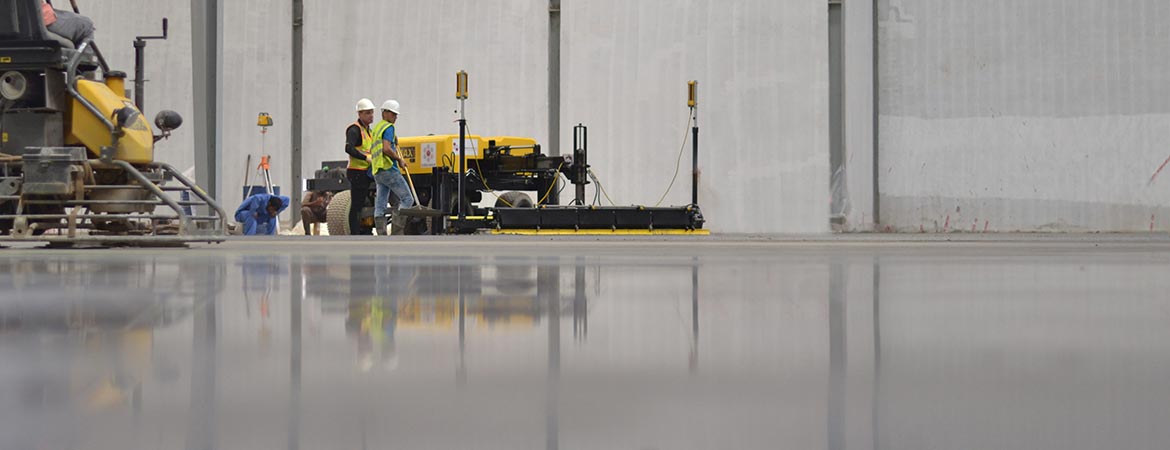With the Covid-19 virus fuelling demand for what was an already burgeoning platform for consumers – online shopping – more companies are poised to automate the picking of goods in their warehouses. However, it’s not just about the technology and robotics that are used in the automation of consumer supply; equally important is the quality and flatness of the floor on which these systems operate, without which robots can be inefficient and vulnerable to breakdowns. That’s why those in the know talk to CoGri Middle East, an organisation with vast experience and expertise in the design, construction, and enhancement of floors in both new and existing warehouse units and distribution centres.
CoGri Middle East is part of the CoGri Group, a consortium of international industrial floor solution specialists, and one of the most accomplished professional concrete-flooring contractors in the region today. With a track record stretching back 35 years, it utilises a comprehensive portfolio of hi-tech, purpose-built specialist equipment to provide a full range of high-quality concrete flooring services and money-saving solutions. Services range from super-flat high tolerance floor construction and large-pour floor construction, through to specialist floor upgrades using their unique Laser Grinder ® system.
Flatter Floors, Higher Profits
With the introduction of high-stacking, very narrow aisle (VNA) warehouses in the late 1970s, it became increasingly essential to have concrete floors that were significantly flatter than in previous years.
A VNA warehouse system is a proven means of utilising warehouse space and volume. Man-up forklifts operate in aisles approximately 2m wide, working at heights in excess of 17m. Any VNA warehouse floor needs to be significantly flatter than equivalent block stacks or wide aisle floors, as a small deviation of just a few millimetres at floor level is significantly magnified once the operating height increases.
To meet the requirement for these high tolerance floors, the first CoGri Group Company (Concrete Grinding Ltd) was established, offering manual floor grinding services for existing uneven floors. As demand grew, a cleaner, more accurate and efficient grinding method was created that could work in operational warehouses – the Laser Grinder®.
Continual development and innovation over the past 30+ years means that todays’ Laser Grinders achieve the best results yet, with guaranteed success.
Today, the CoGri Group operates globally and consists of specialised companies covering all aspects of industrial warehouse flooring.
CoGri Middle East is the regional office for CoGri in the GCC and wider MENA region.
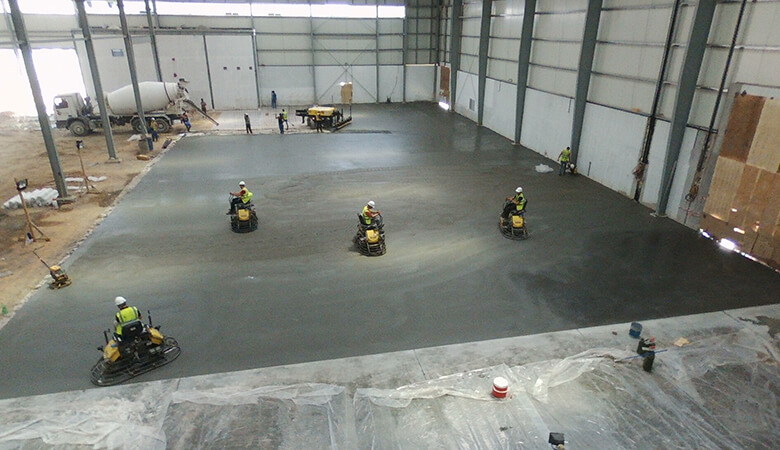
A Broad Portfolio of Expertise
The warehouse floor is the most critical element of a building envelope as it affects the speed, safety and efficiency of the materials handling equipment that runs on it.
CoGri Middle East has a wealth of experience, knowledge, and expertise which, tied in with its comprehensive understanding of the modern warehouse operation, allows it to provide the finest solution to any flooring challenge. This incorporates a variety of distinct services, each one ensuring the very highest quality of workmanship and best value solution.
Floor Construction
Floor Flatness in floor construction is fundamental for many reasons, especially in VNA warehouse units, where achieving the correct floor flatness standards afford warehouse operator’s peace of mind.
Ensuring such fine tolerances provide numerous other benefits too, including optimising the MHE’s performance, reducing maintenance-related costs, and eliminating the chance of picking problems, which include rack impact. Super-flat floors are popular with companies’ accountancy and health & safety departments too, being extraordinarily cost-effective and providing significant safety benefits.
CoGri Middle East offers a complete range of high tolerance and value-added concrete floor construction services for warehouse and industrial units:
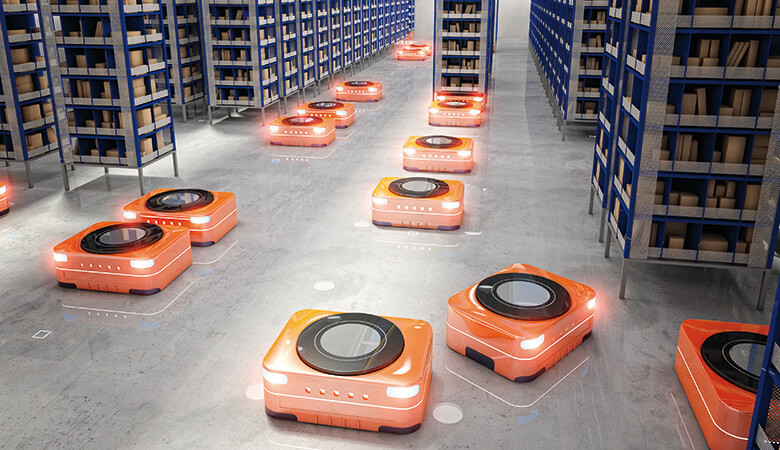
Steel fibre “jointless” or Steel Mesh “saw cut” Large pour Laser Screed floors:
Large pour Laser Screed floors are ideal for conventional warehouse flooring solutions where fast-track programmes are being considered. Flatness is controlled by means of construction lasers and on-site monitoring.
Narrow aisle ‘Superflat’ floor construction
When a ‘right first time’ approach is needed, long strip narrow bay construction provides CoGri with tight control on floor flatness. Accurate results within a millimetre can be achieved, meaning no grinding for VNA flatness compliance.
Cold store flooring
Significant sub-zero temperatures require careful consideration and the floor must be constructed to ensure longevity.
This is highly specialised work because once a cold store facility becomes operational; any remedial work can be a major hindrance to operations, as most repair materials cannot be effective below 5oC. This dictates that the facility has to be put out of action and the temperature raised for any repairs to be performed. Hence, the emphasis on getting the floor right first time.
In recent years, CoGri Middle East has developed a well-earned reputation as a high quality specialist flooring contractor, achieving impressive results and building a repeat business client list.
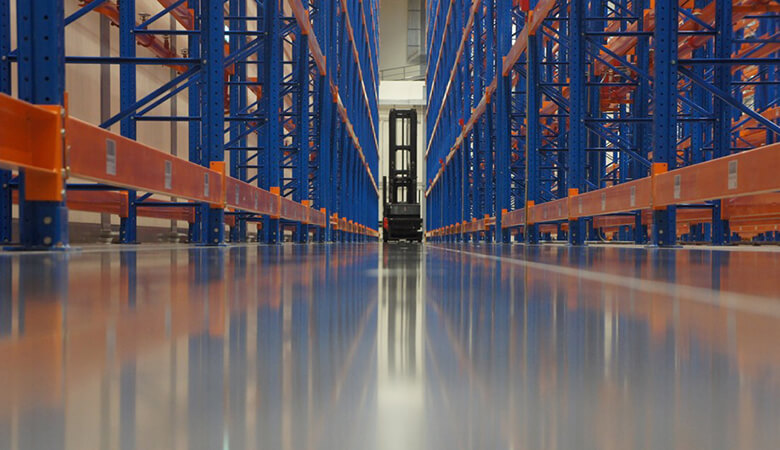
VNA Grinding
At first sight, converting an existing warehouse to VNA, or needing to upgrade a new floor that doesn’t meet specification, can seem a bit of a nightmare. However,CoGri has the perfect solution – grind it right!
The company’s patented Laser Grinder® is a proven solution and guaranteed to deliver a specification compliant floor, achieving conformity with any globally recognised specification (and even ‘one-off’ bespoke ones). Grinding is a one-time investment, unlike overlays and toppings, and floors upgraded by laser grinding are not subject to cosmetic damage, delamination, or blisters. Only one aisle is required at a time, and upon completion of grinding the floor is ready for immediate service.
The CoGri Group pioneered VNA floor grinding technology used to upgrade hundreds of thousand of metres of aisles around the world.
Wire Guidance
CoGri Middle East offers a complete wire guidance installation service for the guidance of VNA trucks or Automated Guided Vehicle (AGVs) systems. The advantages of wire guidance are many, but include:
- Eliminate bottom rack beam
- Easier cleaning under racking
- Less wear and tear on Materials Handling Equipment (MHE) due to banking into rails at the start of aisle
- High volume or pick items can be placed by pallet jack
- Lower long-term maintenance costs on in aisle guidance
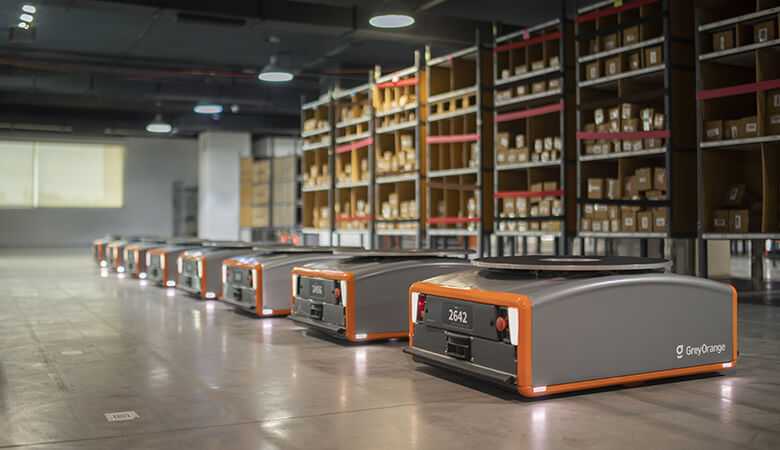
MHE vehicles are equipped at the factory with a pair of sensors, one on each end of the truck, which are connected to a control system that locks the steering when in the aisle. These sensors detect a low-frequency signal from a wire embedded in the floor.
Floor Repairs and Refurbishment
CoGri Middle East can provide floor repair and refurbishment for a wide range of services and scenarios, including floor screed systems, surface preparation, floor grinding, expansion joint repairs, crack repairs, joint stabilising, demarcation line marking and floor maintenance.
Design, Testing, Floor Surveying & Sales
Through its sister companies, Face Middle East, and Face Consultants (in the UK), CoGri Middle East is able to offer design, testing and surveying services, complete with an international Professional Design and Build Insurance cover.
Face Middle East / Face Consultants are regarded as the link between the logistics and construction industries, with an intimate understanding of the requirements of one and the capabilities of the other.
It is important to understand that design is not just the structural design, but also detail design and specification. In every case, Face provideprovides a design that is fit for the intended purpose and can be built economically without being over specified.
Getting Ahead of the Curve
As customer expectations continue to grow, thanks to the rise in e-commerce and speedy deliveries, businesses must work harder to satisfy customers in a world where convenience is critical to where they choose to shop.
Recent advances in robotics and demand have led to a ‘tipping point’ in the number of robots used to automate supply chain operations, with the Amazon robotics systems being an excellent case-in-point. The CoGri Group, for instance, is currently working on multiple Amazon sites globally, testing the newly constructed elevated floor slabs, identifying areas requiring correction, and executing the work until compliance to the desired specification is achieved, ensures that the robots can slide under a tower of shelves where products are stowed, lift it, and move it through the fulfilment centre. This saves an enormous amount of space, allowing for 50% more items to be stowed per square foot. The aim is to increase the speed of delivery while enabling greater selection at lower costs for customers.
Ramping up automation while racing to deliver goods to consumers faster, companies realise that the smoother and quicker the journey between the customer clicking the online buy button and the delivery driver arriving at their door with the goods, the faster the retailer’s profits will arrive.
The CoGri Group may have been established over 30 years ago, but they are continually working alongside associates within the industry (such as MHE, robotics, racking/shelving suppliers) to develop the specifications and best working practices for the next generation of logistics and automation systems.
The expansive data collected over the years of testing floors and floor flatness, coupled with their knowledge of what can be achieved by experienced contractors, means CoGri are viewed by many in the developing sector of logistics as essential advisors and the ‘go to company’ when a fit for purpose specification is needed.
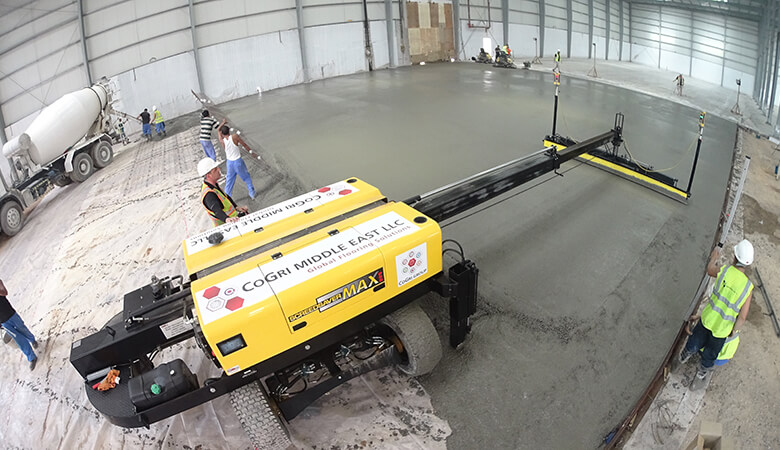
This further demonstrates CoGri’s commitment to not only moving with the times but helping to influence and drive the emerging technologies/systems.
The very nature of warehouses and their applications make them ideally suited to automation and robotics. Goods can be quickly transported, with the robotics interface utilising positioning and measurement systems within the warehouse. However, this technology is advancing rapidly. Amazon’s robots can wirelessly become aware of the technology that employees are wearing, telling them exactly where they are located. They can then avoid heading towards them, removing collision risks and human injury.
As technology develops it will become increasingly interactive with its real-time environment, making robots invaluable within the supply chain.
So, what will the warehouse of the future look like? In all probability, nothing like it looks today. They will become more flexible, with increased capacity, and faster sourcing and delivering of products to dispatch. The result of this, which has already been illustrated during the Covid-19 pandemic, is that instead of big department stores, multi-level fulfilment centres will be at the heart of consumer shopping habits.
This could, of course, leave some companies and warehouses behind the curve; those that do not build or convert their facilities to provide higher density solutions. Those with one eye on the future will incorporate robots, vertical storage or carousel systems…and get the floor right, first time!
Often ignored in the past, and susceptible to cost cutting measures, the floor is now one of the most important components in a warehouse. Today, robotics, VNA, automated guidance vehicles (AGVs); automatic storage and retrieval systems (ASRS) all put ever-greater demands on the warehouse floor than ever before.
This means that an existing warehouse floor may not be suitable without restructuring or, that most frightening of words in the business world, compromise. And if you think that more modern warehouses will not come up against this problem, think again. In fact, they can even make matters worse thanks to their inability to service automation due to lean slab designs, which have been engineered to the limits. When robots are brought into the equation and the demands on the floor change even further, very specific requirements such as surface gloss, friction, abrasion resistance, levelness, flatness, surface resistivity, and even roughness become paramount. Consequently, it is not just the flatness of a floor that is critical; it is now a much more complex and challenging question than that. And even though a structural engineer may understand the design and the loads, putting the MHE and floor together takes an entirely different level of understanding. As a result, the earlier you engage a specialist company, the greater chance you have of success, both in terms of the quality of your flooring and your bottom line.
As CoGri Middle East wins much of its work through repeat business and recommendation, let’s leave the last word to a very satisfied customer, Diesel Technic (M.E.) FZE, with its Warehouse Operations Manager explaining: “Diesel Technic awarded CoGri Middle East the floor repair work in our Jebel Ali Free Zone facility. CoGri’s analytical approach in determining why problems arise in the first place, before they go on to offer a permanent repair solution, along with their professionalism and proven trackrecord, reinforced our decision.
“After agreeing on the scope of work and signing the contract – the team arrived on schedule, installed the repairs with minimal disruption and left our facility in a clean and tidy condition.
For any warehouse floor problems, we would have no hesitation in recommending CoGri Middle East.”
Many more testimonials can be viewed on the CoGri Middle East website: www.cogrimiddleeast.com, or contact them for free advice on your flooring problems.

